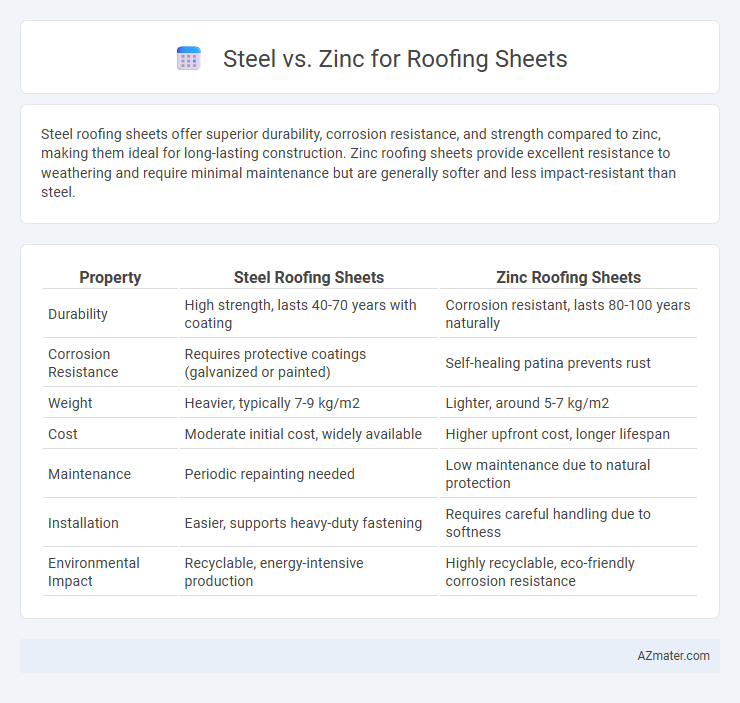Steel roofing sheets offer superior durability, corrosion resistance, and strength compared to zinc, making them ideal for long-lasting construction. Zinc roofing sheets provide excellent resistance to weathering and require minimal maintenance but are generally softer and less impact-resistant than steel.
Table of Comparison
| Property | Steel Roofing Sheets | Zinc Roofing Sheets |
|---|---|---|
| Durability | High strength, lasts 40-70 years with coating | Corrosion resistant, lasts 80-100 years naturally |
| Corrosion Resistance | Requires protective coatings (galvanized or painted) | Self-healing patina prevents rust |
| Weight | Heavier, typically 7-9 kg/m2 | Lighter, around 5-7 kg/m2 |
| Cost | Moderate initial cost, widely available | Higher upfront cost, longer lifespan |
| Maintenance | Periodic repainting needed | Low maintenance due to natural protection |
| Installation | Easier, supports heavy-duty fastening | Requires careful handling due to softness |
| Environmental Impact | Recyclable, energy-intensive production | Highly recyclable, eco-friendly corrosion resistance |
Introduction to Roofing Materials: Steel vs Zinc
Steel roofing sheets offer exceptional durability, high tensile strength, and excellent resistance to heavy weather conditions, making them a popular choice for commercial and residential buildings. Zinc roofing sheets provide superior corrosion resistance and a self-healing surface that protects against environmental damage, resulting in a longer lifespan with minimal maintenance. Both materials are lightweight and recyclable, but steel is typically more cost-effective while zinc offers enhanced aesthetic appeal and longevity.
Material Composition and Properties
Steel roofing sheets are composed primarily of iron with a small percentage of carbon, providing high tensile strength and durability, while zinc roofing sheets consist mainly of pure zinc, offering superior corrosion resistance and natural patina formation. Steel's robust structural properties make it ideal for heavy-duty applications, though it typically requires protective coatings like galvanization to prevent rust. Zinc roofing excels in longevity and self-healing capabilities, as its surface can regenerate minor scratches, enhancing weather resistance and minimizing maintenance costs over time.
Durability and Lifespan Comparison
Steel roofing sheets offer exceptional durability with high resistance to impact, corrosion, and harsh weather conditions, often lasting between 40 to 70 years when properly coated. Zinc roofing sheets provide superior corrosion resistance due to their self-healing properties, resulting in a lifespan of approximately 80 to 100 years, making them ideal for long-term applications. Both materials benefit from coatings and maintenance, but zinc generally offers a longer lifespan with lower susceptibility to rust compared to steel.
Corrosion Resistance: Steel vs Zinc
Steel roofing sheets coated with zinc, often known as galvanized steel, offer strong corrosion resistance by forming a protective zinc oxide layer that prevents rust. Pure zinc roofing sheets excel with superior corrosion resistance due to their natural ability to self-heal minor scratches through sacrificial oxidation, extending lifespan in harsh environments. Zinc outperforms plain steel in resisting atmospheric corrosion, making zinc roofing sheets a preferred choice for long-term durability and minimal maintenance.
Aesthetic Differences and Design Options
Steel roofing sheets offer a sleek, modern aesthetic with a smooth surface and a variety of finishes like matte, gloss, and metallic, enhancing contemporary architectural designs. Zinc roofing sheets provide a unique, natural patina that evolves over time, adding character and a rustic, timeless appeal suitable for both traditional and modern structures. Design options for steel include vibrant color coatings and embossed patterns, while zinc allows for creative detailing through its malleability, enabling intricate shapes and textures.
Installation Process and Ease
Steel roofing sheets offer a straightforward installation process due to their lightweight nature and compatibility with common fastening techniques, making them user-friendly for contractors. Zinc roofing sheets require specialized tools and skills to handle their malleability and ensure proper overlaps, which can extend the installation time. The ease of installation for steel often results in lower labor costs compared to zinc, which demands precision to prevent damage and ensure durability.
Maintenance Requirements
Steel roofing sheets require regular inspection and maintenance to prevent rust and ensure the integrity of protective coatings, particularly in harsh weather conditions. Zinc roofing sheets naturally develop a protective patina that minimizes corrosion, significantly reducing the need for frequent upkeep. The durability and low maintenance demands of zinc make it a preferred choice in environments prone to moisture and atmospheric pollutants.
Environmental Impact and Sustainability
Steel roofing sheets offer high durability and recyclability, with production processes increasingly incorporating recycled materials to reduce environmental impact. Zinc roofing sheets boast exceptional corrosion resistance and longevity, often lasting over 80 years, reducing replacement frequency and resource consumption. Zinc's natural patina forms a protective layer that minimizes maintenance and environmental degradation, making it a sustainable choice for long-term roofing solutions.
Cost Analysis: Upfront and Long-Term
Steel roofing sheets typically have a higher upfront cost compared to zinc due to stronger material properties and greater durability. Over the long term, zinc roofing presents lower maintenance expenses and superior resistance to corrosion, which can reduce overall lifecycle costs despite its initial price premium. Cost analysis reveals that while steel offers immediate savings, zinc's extended lifespan and minimal upkeep provide better economic value for long-term roofing investments.
Best Applications and Recommendations
Steel roofing sheets offer superior strength and durability, making them ideal for industrial buildings and areas with extreme weather conditions. Zinc roofing sheets excel in corrosion resistance and self-healing properties, suitable for coastal regions and historic or architectural projects requiring aesthetic appeal. For long-term performance, steel is recommended for heavy-duty applications, while zinc is best for environments prioritizing longevity and minimal maintenance.

Infographic: Steel vs Zinc for Roofing Sheet
 azmater.com
azmater.com